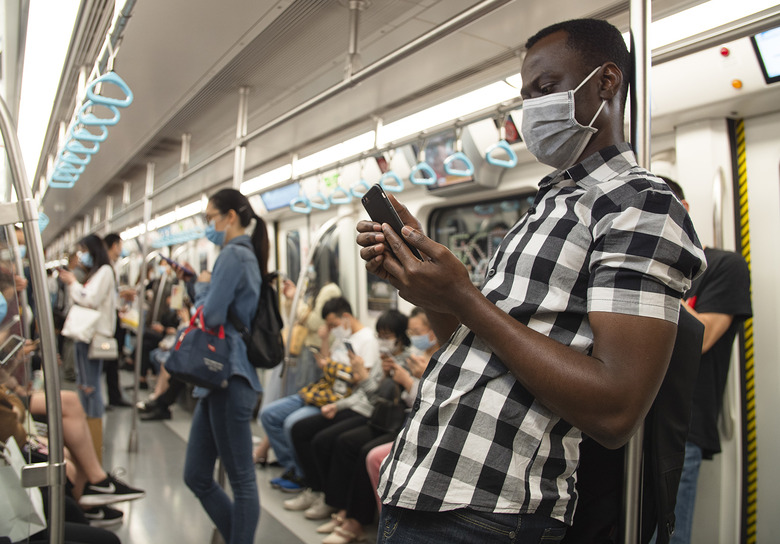This Nasal Spray Might Be Able To Block Coronavirus Infections
- A team from Columbia University developed a nasal spray that blocked the coronavirus from infecting cells in the nose and lungs in ferrets for a full day.
- The drug works by blocking a key chemical process that happens when the virus attempts to infect the cells, which is the only place where it can multiply.
- The scientists will have to prove the drug can offer the same protection in humans in clinical trials.
Dr. Anthony Fauci explained recently that the first coronavirus vaccines might not be able to block infections. Doctors want the drugs to prevent severe COVID-19 illness. It's too early to tell exactly how vaccinated people will deal with COVID-19, as the research for Phase 3 trials hasn't been published, but one possible scenario involves testing positive after vaccination. The virus might infect the nose, which is usually the first stage of infection. But by the time the virus takes hold, the body will already be trained to recognize it and neutralize it. This would prevent the virus from descending into the lower airways and multiply to such an extent that respiratory complications appear.
Scientists are also working on drugs that might block infection completely. One idea is monoclonal antibodies, which could provide a boost of neutralizing antibodies that grant the patient temporary immunity. Also in the works is a drug called ivermectin, which showed questionable efficacy in a test in India. But one of the most exciting ideas so far is a nasal spray that has the potential of giving a full day of protection against infection.
Ferrets who are given the spray are protected from the coronavirus for a full day, The New York Times reports. Scientists will have to study the compound on humans and see if it works on them as well.
Scientists at Columbia University lead an international effort into the development of a substance that has anti-viral properties. The drug can block the virus from infecting cells in the nose and lungs by interposing itself between the cell receptors and the spike protein that acts like a key that opens those cells. Without access to cells, the virus can't replicate itself. The spray does sound like a vaccine that produces neutralizing antibodies that inhibit the same spike protein.
The study was published in pre-review form and will need more research. But the results so far are promising.
The researchers used the spray on six ferrets, which were then split into three pairs, each one placed in a different cage. A placebo spray was given to two ferrets for each cage. Then the researchers brought inside the cage a ferret that was infected with SARS-CoV-2. The ferrets cohabitated for a day, and then researchers tested them.
None of the ferrets who received the drug was infected. The placebo ferrets all got the illness. "Virus replication was completely blocked," the authors said.
If it works this well in humans, you could sleep in a bed with someone infected or be with your infected kids and still be safe," Dr. Anne Moscona told The Times. The spray attaches to the cells in the nose and lungs, lasting for about 24 hours.
The spray contains a lipopeptide made of a cholesterol particle linked to a chain of amino acids. The lipopeptide matches exactly a sequence of amino acids in the spike protein used to attach to cells.
The researchers explained that the spike protein unzips to expose two amino acid chains to link up to the cell wall. The cell zips back to complete the process normally. But that's where the lipopeptide inserts itself, and the virus can't latch on to the cell. The process is similar to a space ship trying to dock to a space station in movies. If the two can't latch according to a predetermined sequence of events, the space ship can't connect to the station to spill its contents (the people aboard) into it.
"It is like you are zipping a zipper, but you put another zipper inside, so the two sides cannot meet," Columbia University microbiologist Matteo Porotto said.
Interestingly, the amino acids come from a stretch of the spike protein that rarely mutates. The researchers used the lipoprotein on four different strains of coronavirus, including the Wuhan and Italian strains. They also used it on SARS and MERS, two other coronaviruses that caused troubling epidemics in the past 20 years. The particle protected cells completely against SARS-CoV-2 and partially against SARS and MERS.
The good news does not stop there, as the lipoprotein is affordable to produce. It comes as a freeze-dried white powder that doesn't need refrigeration. The substance would then be mixed with sugar and water to produce the spray. The drug could be made available anywhere, as a result, without posing logistical issues. Some of the vaccines in Phase 3 testing will need to be kept at temperatures well below freezing. Countries lacking the proper infrastructure will have a hard time deploying these vaccines.
The nasal spray would be more accessible than monoclonal antibodies that are deployed intravenously in hospital settings.
That said, there's no telling if the spray will be as effective in humans. Trials will also be required to determine the drug's safety before the spray can be approved for use.
The team did apply for a patent on the product and will require additional funding for clinical trials. The ferret study was funded by the National Institutes of Health and the Columbia University Medical Center.
Other researchers are working on spray and aerosol treatments for COVID-19 as well. One of them delivers interferon to the airways to treat an existing infection. A different one proposes a custom particle for the same purpose. Then there's a project that developed an antibody-like nanoparticle that can be used in nebulizers. Finally, researchers from Hong Kong are working on a dual coronavirus-flu vaccine delivered via a nasal spray.
